SEO without link building. Is it possible?
Most experts would say no.
After all, links have been an integral part of search engine optimization for years.
However, your content may still rank, even without backlinks.
In fact, different strategies can be used.
Do you want to know how?
Read on.
Contents:
Are Backlinks Important for SEO?
Links have always been an important ranking factor for Google.
They are among the top three ranking elements, along with content and RankBrain.
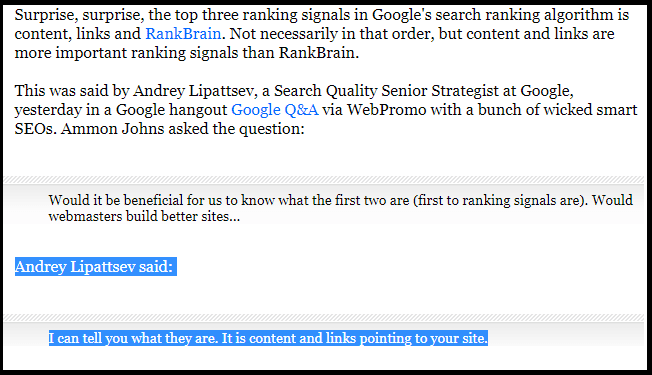
But in the past, links were one of the few ways that Google could use to determine the quality of a website.
A website with many links was seen as being more popular and, therefore, more trustworthy.
Today, things have changed.

In 2020, Google’s John Mueller tweeted that links are
Definitely not the most important ranking factor.
Plus, since Google’s March 2024 core update, much has changed.
Among the many things, there’s been a significant edit in the spam policies documentation:
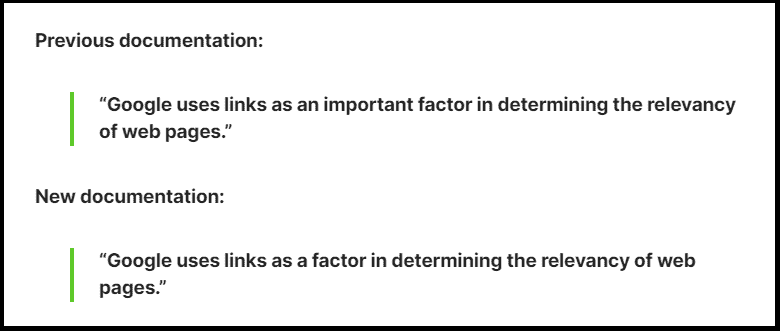
Also, during a search conference in 2024, Gary Illyes confirmed that:
We need very few links to rank pages… Over the years we’ve made links less important.’
So, are links important or not?
According to a study by Moz, links are one of the most crucial ranking factors.
But, although links are still necessary for a good ranking, the data shows that Google is now focusing on the quality of those links rather than just the quantity.

Now, you may be wondering:
What does a good link look like?
According to Google’s John Mueller:
“A good link… so I mean the traditional good link is someone who comes across your website and thinks it’s a fantastic website and recommends it to other people with a link.”
Now, let’s dig a little deeper.
John Mueller’s answer, while not comprehensive, does confirm the importance of promoting your website without resorting to spammy tactics.
Here is a further statement:
“Links are really important for us to find content initially.
So it’s like if nobody links to your website ever then we’re going to have a hard time recognizing that it even exists.”
As a final thought, Mueller stated that if the content is high-quality, once it’s been discovered, links aren’t as essential.


But wait — there’s more.
Let’s see it from another point of view.
In a tweet from 2017, John Mueller of Google stated that the main important factor for ranking a website in top search results is “awesomeness.”
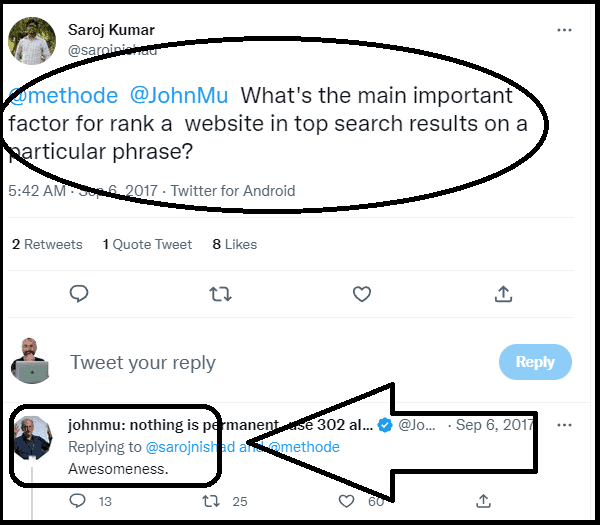
But, with 2 billion websites today, how can you create that awesomeness?
The answer is always the same:
Quality content.
If you want to rank on Google, you need to create quality content that is relevant and useful for your audience.
But is it really that “easy”?
Not at all.
In fact, today, Google has become much more sophisticated.
It can now use different elements to determine the quality of a website.

That’s not to say that links are no longer important. They still are.
However, they’re not as important as they used to be.
It’s because links are not the be-all and end-all of search engine optimization anymore.
Is SEO Without Link Building Possible?
The short answer is yes.
SEO without link building is possible.
In fact, it’s become more and more common in recent years (and, in specific niches).
In an interview in November 2022, Google’s John Mueller said that he can see a future where links are not as important to the Google Search ranking algorithm as they are today.
He also suggested that links might not be as heavily counted as they have been in the past.
To make a point:
as Google has become better at understanding the quality of a website, it’s no longer as reliant on links.
This means that you can still rank highly in search engines without having to build lots of links.
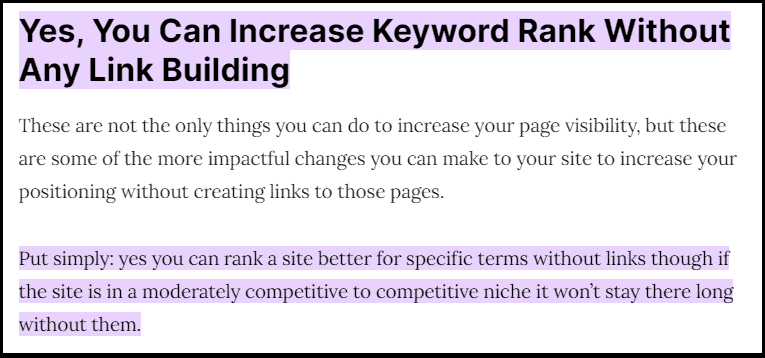
Of course, this doesn’t mean that you should completely forget about link building.

But, if you want to rank your website without them, there are other things that you can do, like the strategies listed in the next section.
To sum it up, stop worrying so much about links, and instead focus on your content.
Nowadays, it’s all about having better quality content. Generally speaking, if your content is great, people will link to it without you even having to ask or do any extra work.
In fact, my post about using bucket brigades in copywriting has been linked naturally in a blog post on Ahrefs:
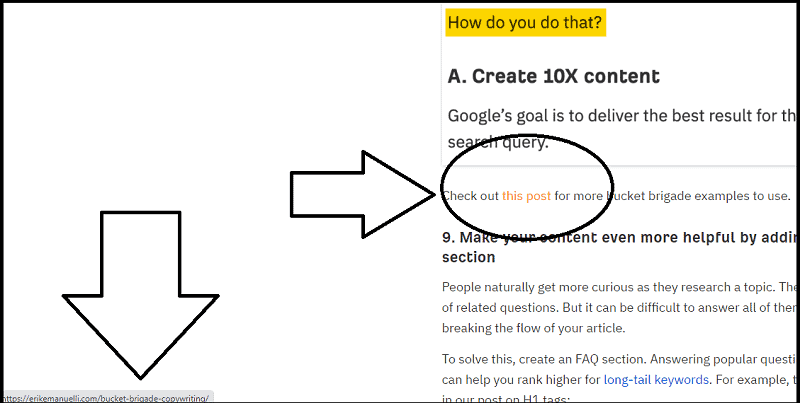
How to Rank on Google Without Backlinks
In this section, let’s take a look at some of the best SEO techniques that don’t involve link building.
Parasite SEO
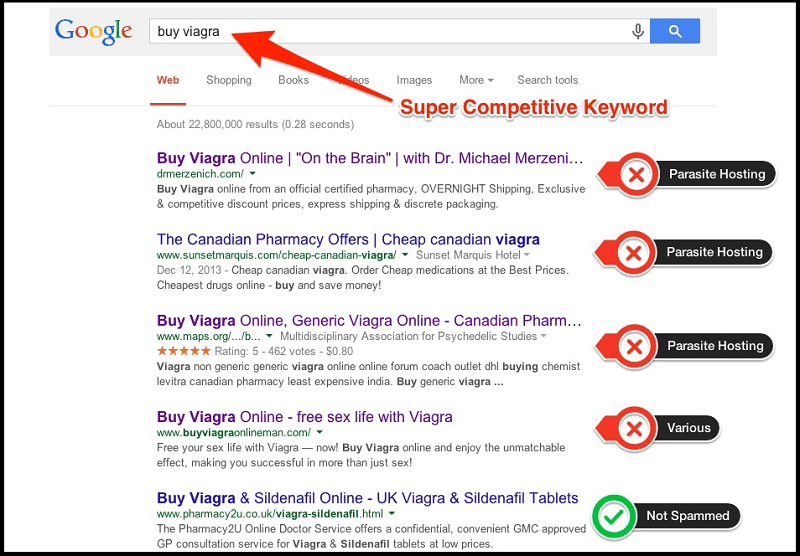
Parasite SEO is a technique that uses other people’s websites to rank your own.
It’s also sometimes known as Satellite Sites or Barnacle SEO.

You find a relevant website with a good domain reputation and a big audience.
Then, you create content on their website (usually in the form of a blog post or article), to take advantage of their existing traffic and authority.
Of course, you don’t want to just create any cheap content.
It needs to be high-quality and relevant to its readers. Otherwise, you’ll just be wasting your time.
And, if done correctly, this technique can be very effective. It’s because you’re piggybacking off the authority of an already popular website.
Of course, it’s not easy to get your content published in someone else’s place.
But, if you can, it can be a great way to drive traffic and improve your online visibility.
To help you get started, here are some of the best parasite SEO sites you can use:
- https://www.quora.com/
- https://medium.com/
- https://sites.google.com
- https://academia.edu/
- https://evernote.com/
- https://weebly.com/
- https://wordpress.com/
- https://www.wattpad.com/
- https://www.tumblr.com/
Topical Authority
Topical authority involves creating a website that covers a specific subject in-depth.
The idea is to become the “go-to” resource for that topic.

This might include blog posts, articles, infographics, ebooks, and more. Or, a list of free SEO resources, as I’ve done here:
The key is to make sure that your website is the most comprehensive resource on that subject.
This way, when people search for information related to it, your website is more likely to come up.
And, over time, you can build up a strong reputation as an authority on that subject.
But wait, there’s more.
If your website contains content that is topical and relevant for longer periods than your competitor’s websites, you will have a significant advantage.
For example, let’s say you write an article about SEO trends for 2019.
That article will be relevant and useful for a few months. But, eventually, it will become outdated.
On the other hand, if you write an article about SEO fundamentals, it (mostly) never goes out of style.
That article will be just as relevant a year from now as it is today.

To find sub-topics around the main subject, you can use Google’s “related searches” feature.
Just type in the main keyword, for example, “SEO tips”.
Scroll to the bottom of the search results page.
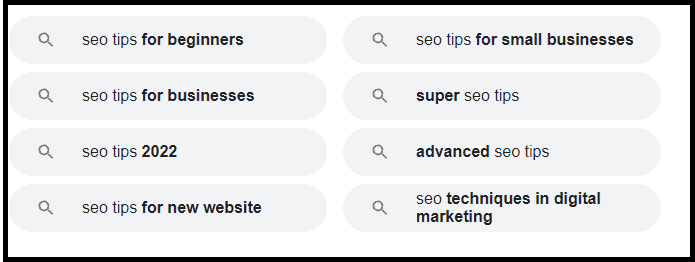
There, you’ll see a list of related searches. These can give you ideas for sub-topics to write about.
Pretty simple, isn’t it?
Or, you can use AnswerThePublic.com.
Just type in a keyword, and it will show you a list of questions people are asking about that subject.
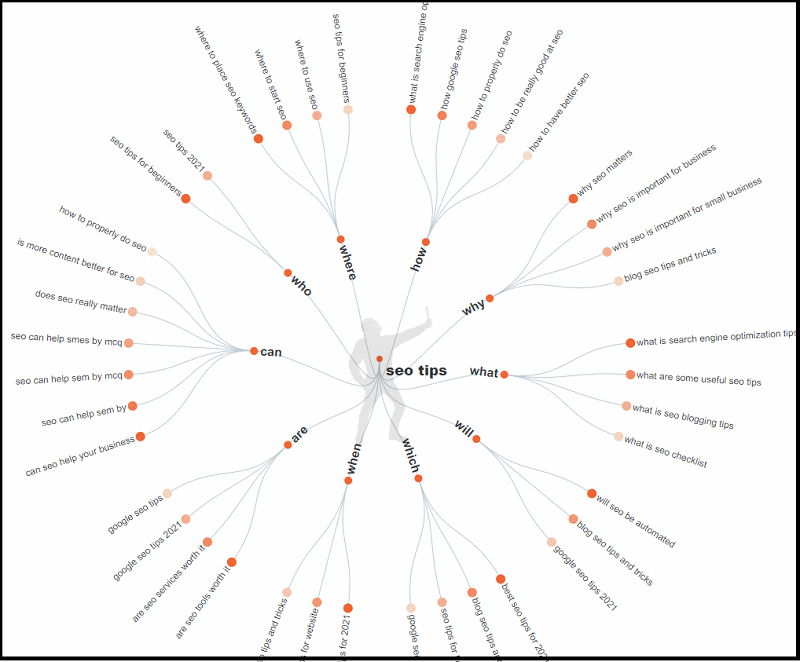
This can be a great way to come up with ideas for content that you know people are already searching for.
On top of that, you may want to take advantage of semantic SEO. It’s the practice of optimizing your content to target not only the main keyword but also all the related terms.
By targeting a broader range of keywords, you can improve your chances of ranking for long-tails, including LSI terms.
Keyword Research
Another way to rank without link building is through keyword research.
This involves finding the right terms to target with your content.
If you choose the correct ones, you may have better chances to be placed high in the search results without having many (or any) backlinks.

Both of these tools are free to use.
With Google Keyword Planner, you simply need to enter a term, and it will show you the average monthly searches, as well as related terms.
For example, I did a quick search by typing “voice search“:
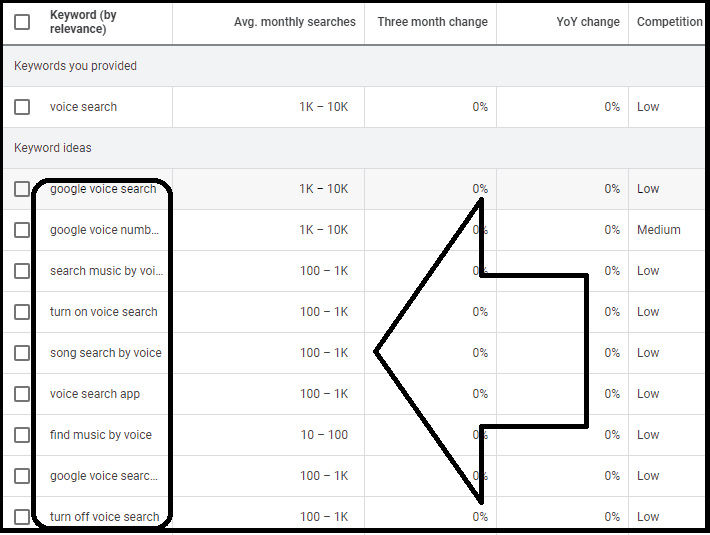
As you can see, there are keyword suggestions, as well as the average monthly searches and level of competition.
Sweet, isn’t it?
This can help you come up with ideas for content that people are already looking for.

In particular, you can use it to find out which terms your website is already ranking for.
To do this, just log into Google Search Console, and then click on “Search Results.”
Next, check the “Queries” tab. Here you can select up to 500 rows per page.
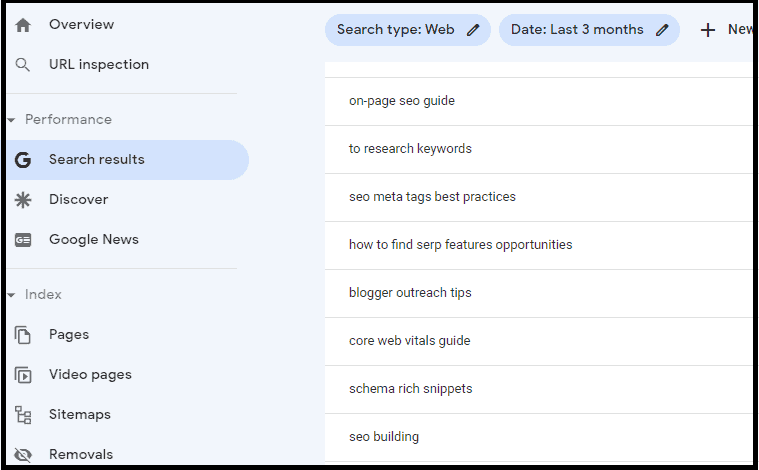
In this tab, you’ll be able to see a list of the terms your website is already ranking for. You can use this information to come up with ideas for new content.
And, if you see that your website is already ranking for a particular keyword, you can try to optimize your website further.
For example, you could improve the title tag, meta description, and on-page content to better target that term.

You just need to sign in to your account or proceed to a new registration.
Then, you can submit your website for free and verify it to get a “Project” in your dashboard.
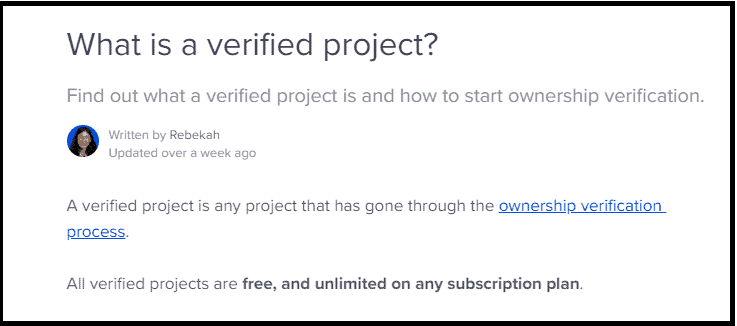
Here, you can access many insights such as backlinks, organic traffic, and organic keywords.
If you click on the “organic keywords” section, you can get a list of the terms your website is already ranking for.
You can use this information to discover new topics to write about.
For example, if you list your keyword per difficulty, you can get ideas with easy terms to rank for!
Like this “SEO without link building” guide:
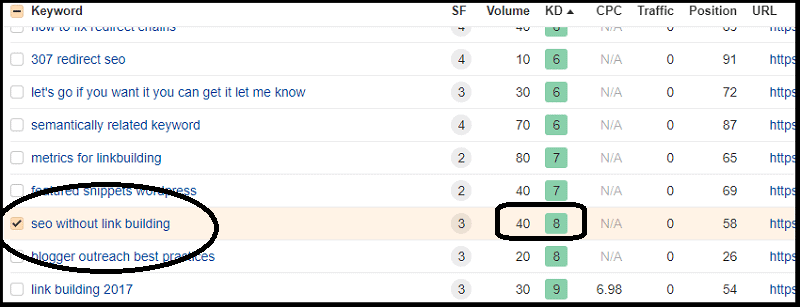
In fact, the free keyword difficulty checker gives a score of just “8”:

This gives an estimation of how hard it is to rank in the top 10 organic search results for a keyword on a 100-point scale.
On-page SEO
Another zero link-building strategy is to focus on on-page SEO.
It’s the process of optimizing your website’s pages to rank better in the search results.
Do you want to learn how to?
There are several different things you can do.
For example, you can improve your title tags:
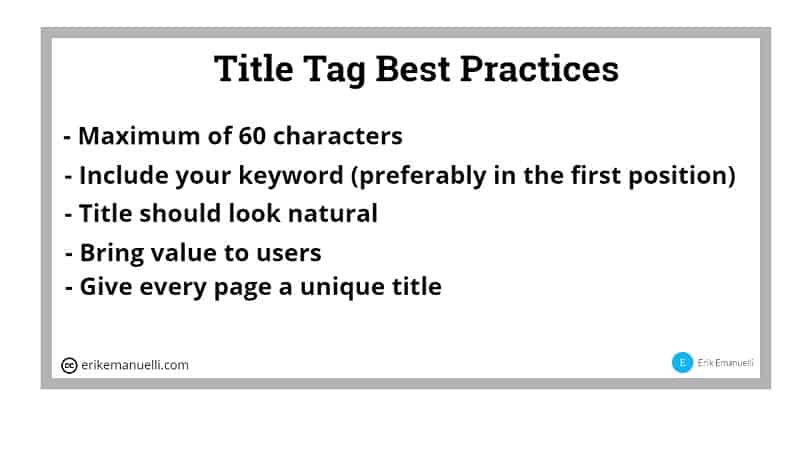
But there are many other things you can take care of.

- Include Your Keyword in the Title
- Include Your Keyword in the URL
- Optimize Your Title Tag
- Use Your Keyword In The First 100 Words
- Write an Optimized Meta Description
- Use Your Keyword in Sub-Headings
- Optimize Your Images
News
Here’s how it works.
You create a press release about your product or service.
Then, you submit it to a news website or press release directory.
And if your content is newsworthy, it will be picked up by other websites and news outlets.
This can result in a ton of exposure for your website. And it could help you get more traffic.
Here are some popular places you can use:
- PRWeb
- PR Newswire
- Business Wire
- Marketwired

Internal Links
Many people are not aware of the power of internal linking.
It’s the practice of linking to other pages on your website from within your content.
It is a great way to help search engines crawl and index your site, and to improve the user experience (by giving your visitors more content to consume, based on the topic they are already reading).
To do this, just add links to other pages on your website from within your blog posts and articles.
For example, if you’re writing an article about orphan pages, you could link to other SEO-related content on your website.
This would help search engines understand what your website is about, and it would also help visitors find related posts.
Plus, it will pass page link authority from one page to a new one, which is always beneficial for SEO.
And remember, there’s no internal linking over-optimization penalty.
This means you can abuse keyword-rich anchor texts as much as you want!
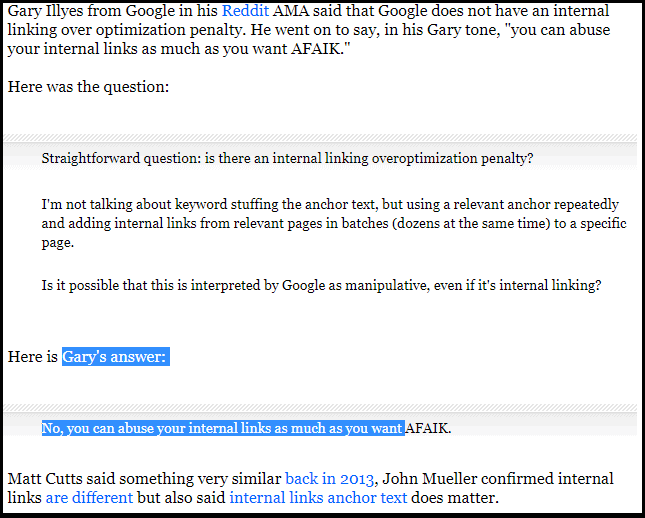
Organic CTR
Organic CTR (click-through rate) is the percentage of people who click on your listing in the search results.
And a higher organic CTR means more visitors to your website.
So, if you want more traffic from search engines, here are some easy-to-follow things you can do to increase your SERPs’ click-through rate.

- Focus on Improving Title Tags
- Optimize Your Content for Featured Snippets
- Use Short and Attractive URLs
- Experiment Using Brackets In The Title
- Try Using Numbers In Your Title
- Optimize Your Meta Description
- Add the Year To Your Title
- Do Not Use Clickbait
- Sparkle Emotion
- Use a Table of Contents
UX signals
User experience (UX) signals are a relatively new ranking factor.
They refer to how users interact with your website once they land on it.
For example, if someone clicks on your listing in the search results and then immediately goes back to the SERP and clicks on another option, that’s a sign that your website’s UX is poor.
On the other hand, if someone clicks on your listing and then spends a long time on your pages, that’s a good sign.
Search engines like Google track UX signals to try and understand which websites provide a good experience for users, and which ones don’t.
And it’s thought that they use this information to help rank websites in the search results.
Many different UX signals search engines look at, but some of the most important ones are:
- Time on Site
- Bounce Rate
- Pages per Session
Time on Site
Did you know that websites that have a longer “time on site” generally rank higher on Google?
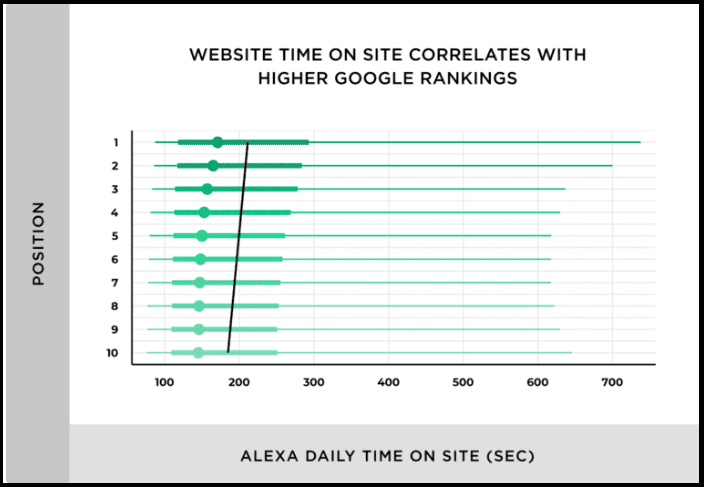
This SEO statistic is based on research by Backlinko and shows that, on average, a website that is listed on the first page of Google search results has a time on site of 2.5 minutes.
Bounce rate
It’s the percentage of people who click through to your website from the search results and then immediately leave (i.e., they “bounce” back to the SERPs).
A high bounce rate could be a bad sign.
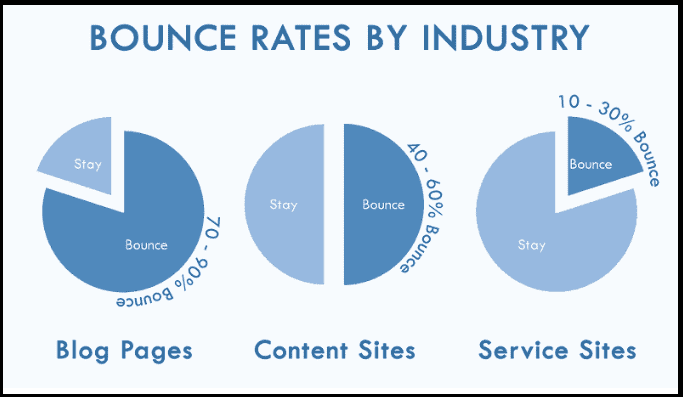
Pages per Session
This is the average number of pages that a user views during a single session on your website. A high page-per-session count is usually a good sign.
To improve your website’s UX, there are many things you can do, such as:
- Make sure your website loads quickly
- Ensure your pages are mobile-friendly
- Make sure your site is easy to navigate
- Create well-written and informative content
- Make sure you have a good design
Schema Markup
Schema markup is code that you can add to your website to help search engines understand your content.
For example, if you have a page that talks about a recipe and you use schema markup, Google may display it as a rich result in the SERPs.
Like this one:

As you may imagine, it can be a great way to increase your organic click-through rate.
These are the so-called rich snippets.
They are special search results that include additional information about your websites, such as reviews, prices, and images.
What does this mean for you?
It can be a great way to increase your organic click-through rate and get more traffic from search engines.

Core Web Vitals
Core web vitals are a set of metrics that measure the performance and usability of your website.
They include things like page load time, interactivity, and the stability of your content as it loads.
Google has confirmed that these metrics are a ranking factor.
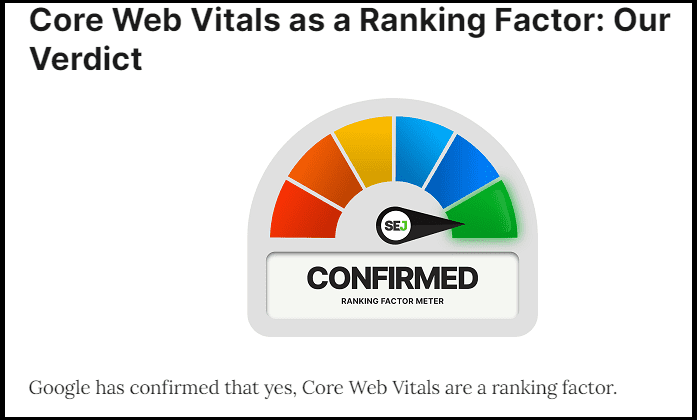
So if you want to rank better in the search results, you need to make sure your website has good core web vitals.
There are three main metrics that Google is focusing on:
- Largest contentful paint (LCP). This measures how long it takes for the largest element on your page to load.
- Interaction to Next Paint (INP). This is how long it takes for your page to become interactive.
- Cumulative layout shift (CLS). And this one is how much your content shifts as it loads.
To improve your website’s core web vitals, there are a few things you can do:
- Optimize your images
- Minimize your CSS and JavaScript
- Use a content delivery network (CDN)
- Improve your server response time
Before You Go
Is SEO without link building possible? Yes, it is.
In fact, there are many different SEO techniques that you can use to improve your website’s ranking in the search results, and many of them don’t involve creating links.
So if you’re not interested in link building or if you’re simply looking for ways to rank higher in the search results without getting more backlinks, there are plenty of options available.
You may want to dig deeper by going through these guides:
Now, it’s over to you.
Do you have any questions?
Let me know in the comments below!

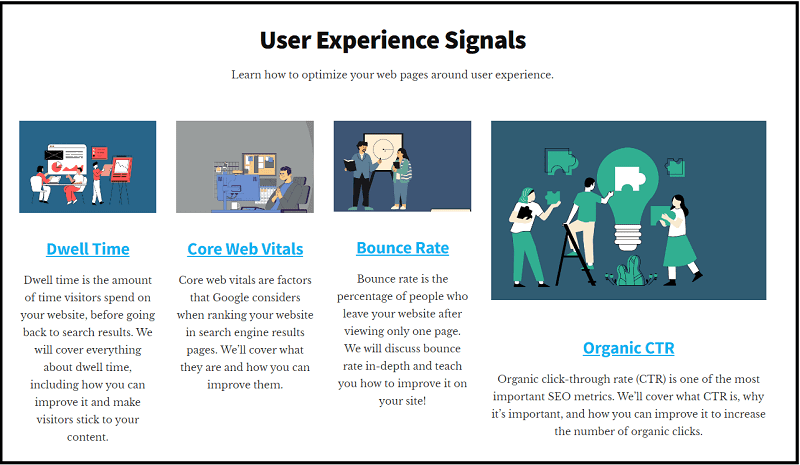
Link building is a complicated topic, and I’ve spent most of my time building quality links by writing great content, and writing for relevant guest blogs in my niche. But I feel it is not enough. I enjoyed these other ways to rank in Google aside from link building, because it gives me more ways to rank since I’m not a definitive expert at link building. These will definitely be put into use on my site. I am also fortunate to have a web host that employs some of these strategies into their website builder design and features. Great post.
Hi Randall,
thanks for the positive feedback!
These link building guides might help you:
https://erikemanuelli.com/link-building/
https://erikemanuelli.com/link-building-strategies/
Hi Erik,
These are indeed very helpful ways to improve SEO without link-building. I have never been a fan of it, honestly, but thankfully I have seen quite some success with SEO basics like targeting low-competition keywords, internal linking, and building topic clusters.
I suppose good CWB metrics help your SEO, but if they are not great, do they hurt your SEO?
Hi Poulomi.
Well, the answer is yes and no.
Google has said that you don’t have to have perfect Core Web Vitals scores in order to rank well in its search engine. However, having low scores could mean that other websites with better metrics may be given priority when it comes to ranking.
As such, it is important to ensure that your Core Web Vitals scores are up to par, as they could be a deciding factor. That being said, you should also focus on other aspects of your website’s performance such as site speed and mobile-friendliness if you want to ensure that your SEO is at its best. Even if your Core Web Vitals scores might not be perfect, there are still other ways to improve your search engine rankings.
You have put together all the ranking factors very well. Highly recommended article for beginners! Also, your overall site & articles are amazing. I am happy to have discovered it.
Thanks for the positive feedback, Jayteerth.
Reading your comment made my day. 🙂
Oh my goodness. this article is awesome. thanks for these tips. i always feared link building.
Good to hear this post helped you, Winfred.
SEO is a huge field with a diverse selection of tools that you can use in even more diverse ways!
Just don’t be afraid to experiment!
Thank you for your hard work keep it up!
You’re right, Alan.
And, in SEO there’s so much to learn that, in the beginning, it seems overwhelming.
But, as the knowledge (and results) improve, also satisfaction comes.
Gratitude for the thumbs up!
Hello Erik,
I haven’t heard the term “Parasite SEO” It seems to be a good and effective technique to leverage other blogs or websites SEO and traffic. Keyword research is very important to rank better and cut down your competition. I prefer to start with low-difficulty keywords and use long-tail keywords. Thanks for sharing this helpful post.
Regards,
Vishwajeet Kumar
Good to hear you learned something new here, Vishwajeet.
Thanks for reading and commenting.
sooo comprehensive article about seo from different view. Best new knowledge this week for me, thank youu
Sweet, Nico.
Feel free to come back for more. 🙂
Hi Eric,
you make link building look very easy and enjoyable. Thanks for sharing this detailed piece.
Good to hear you enjoyed the content.
Thanks for the nice comment, Mike.
Interesting read. Success does indeed depend on creating quality content that answers questions and helps your audience solve problems and grow. If you do that the right way, your legend will grow and people will share your content (and link to it as well – without having to put the effort into link building).
Hi Anthony,
glad to see you here.
It may take some time to do that, but when you start seeing results, it’s sweet! 🙂
Thanks for visiting and commenting.
I have been looking to rank my post without backlink . Your post is indeed helpful.
Good to hear this post was helpful, Kristhina.
Definitely worth a read for anyone looking to up their SEO game without diving into the complexities of link building.
Thanks for the feedback, Phyniques.